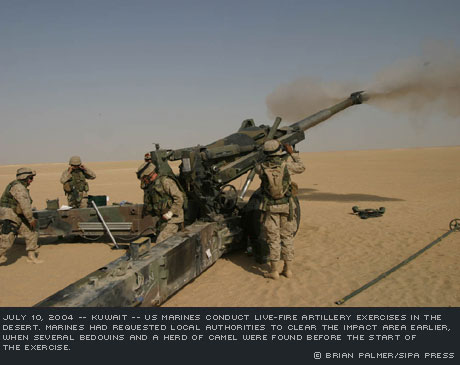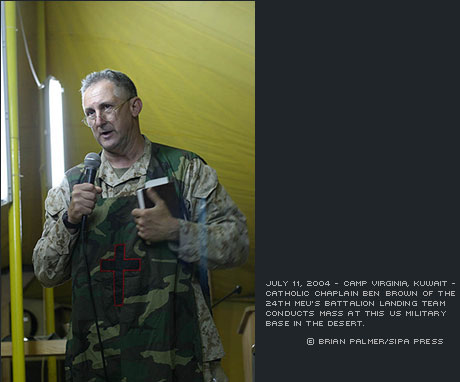After
a series of delayed flights, the 24th MEU Command Element arrives
at Camp Virginia, Kuwait. It is an enormous base erected in the middle
of a swath of scorching desert. There are thousands of US military
personnel here plus a smattering of international troops from Bulgaria,
Mongolia, Poland, El Salvador, Japan, and a few more countries. South
Asian men -- from Pakistan, India, and Nepal -- who work in concessions
(the laundry and mess hall, for starters) run by American companies
form another army, one of low-end laborers. KBR, formerly Kellogg,
Brown, and Root ("Same Company, New Name, More Impact")
is here. So is MPRI, another military contractor.
The weary disembarking Marines are immediately handed 1.5 liter bottles
of Abraaj-brand mineral water and cards bearing the "Rules of
Engagement" and "Rules for Use of Force," the specifics
of which I am not allowed to release. IDs are checked and Social Security
numbers are entered into the camp's database. The Marines are then
herded into an arrival briefing by CFLCC, Coalition Forces Land Component
Command.
"You are in a danger zone right now, here in Kuwait," US
Army Lt. General David McKiernan says in the videotaped portion of
the presentation. The video urges all personnel to stay alert, both
here and in Iraq. It is also provides shorthand hints for conducting
oneself among Iraqis: "Do not stare at the women.... Shake hands
firmly.... Punctuality is not necessarily their priority." Do
not show bottoms of one's feet; do not ask specifics; "and do
not mock calls to prayer."
Subsequent briefings by Marine commanders will cover similar territory,
but in the Corps' jaw-dropping, fuck-you manner. "We are going
to kill and kill and kill -- not the innocent, only the enemy -- until
they are sick of this war," General James Mattis, commander of
the First Marine Division, tells the Marines of the 24th MEU. During
my week at Camp Virginia, I hear a few, but not many, Marines refer
to "hajjis" and make other saddening and disparaging remarks
about the folks who live in this region. But I also run into a lance
corporal who shows me her Iraqi Arabic CDs and tells me she's struggling
to find time to continue studying.
"I want to put an Iraqi face on what we're doing," Colonel
Ron Johnson, the 24th MEU commander tells an assembly of officers
and senior enlisted personnel. That means training the Iraqi National
Guard to beat back the forces who attack the ING and the US military.
"Be patient with the Iraqis," Johnson continues. "I
know you're going to look at them and laugh. You're going to see young
kids with broomsticks trying to do squad-level tactics... Don't let
your men look down at these guys."
"Take the sunglasses down and talk to them eyeball to eyeball.
In the Arab world, the eyes tell the truth," Johnson adds. "Give
these people respect. That's all they're looking for." |


